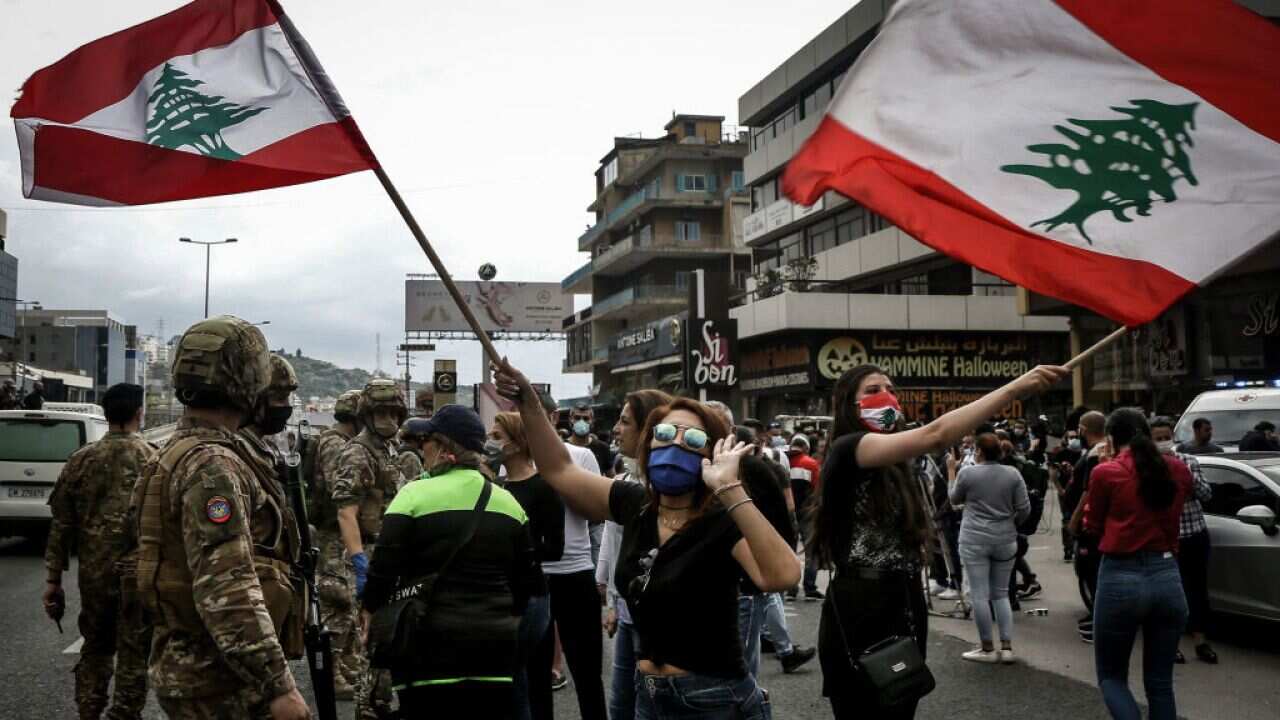Watch Dateline's documentary Bank Robbers at 9.30pm on Tuesday 9 May on SBS or stream via .
In August last year, Ahmad al-Sheikh Hussein received a phone call that would throw his world into a tailspin.
“It was around seven o'clock, and I was with my son at his training in western Sydney. One of my brothers in Lebanon telephoned me. He told me that our brother had attacked a bank.”
Ahmad was informed that his brother, Bassam, had walked into a local bank branch in west Beirut’s Hamra district carrying a rifle and container of petrol and had threatened to burn down the building if the manager didn’t give him exactly US$210,000 ($315,000). It was his total savings.
Over the last few decades, Lebanon has lurched from one crisis to the next and is now in the throes of the worst economic collapse any country has experienced in more than a century, with three-quarters of its population living in poverty.
Inflation has been triple-digit, and the Lebanese pound has lost around 90 per cent of its value against the US dollar. As people struggle to afford basic necessities, such as food and medicine, many have been locked out of their own savings. Bassam was one of them.
There have since been at least 10 other robberies where people have stormed banks out of despair to seize back their deposits. As with Bassam, these would-be Robin Hoods are not being formally charged or facing prison beyond their initial arrest, but are instead garnering widespread sympathy and judicial leniency.
“If you knew Bassam, if you met him, not because he's my brother, but he's a very, very good man. The bank pushed him. They forced him to do what he did,” said Ahmad.

On 11 August 2022, Bassam al-Sheikh Hussein took hostages inside a bank in Beirut, where he had been a customer, demanding the bank let him withdraw his savings so that he could pay for his father's medical treatment. Source: AP / Hussein Malla/AP
After he learned what Bassam did, he drove straight to his other brother’s home in the Sydney suburb of Roselands. They watched Lebanese news online and could see Bassam at the bank on live TV.
“I was afraid they would shoot him. I feared for his life.”
With Bassam still inside the bank, Ahmad booked a ticket to Beirut and flew the next day.
Desperation in a crisis
With much of his family in Australia, Bassam had become the main caretaker for their elderly parents. Their father was showing early signs of dementia. Last year, he suffered a fall, which left him in hospital. So Bassam needed to access his savings to pay for medical bills. He went to his bank but was turned away by the branch manager.
“The thing is,” says Ahmad, “When Bassam returned with the rifle, he wasn’t robbing the bank. He was desperate and trying to withdraw his own money”.
Ahmad says it’s not people like his brother who have perpetrated Lebanon’s most audacious heist.
“It’s the politicians,” he says. “They took all the money for themselves, for their children, and they sent the money outside Lebanon.”
After years of alleged corruption and economic mismanagement, the government defaulted on its foreign debt and Lebanon’s banks started to run out of money.
The World Bank says political graft has driven the country to near bankruptcy. In a 2021 report, the bank called this crisis “a deliberate depression orchestrated by an elite that has long captured the state and lived off its economic rents”.

Members of the Depositors Association of Lebanon and anti-government activists protest against Riad Salameh, the governor of Lebanon's Central Bank, and Makram Sader, secretary general of the Association of Banks, in Beirut in October 2021 as banks tightened limits on foreign currency withdrawal. Source: EPA / Nabil Mounzer
At first, depositors were limited to withdrawing US$1,000 ($1,500) per week under the unregulated limits. Then it was lowered to US$400 ($600) a week, then US$100 ($150) a week. Many people say they’ve been unable to withdraw even these smaller amounts due to a shortage of cash.
As banks basically halted their services, Ahmad says, the only ways to help their family back in Lebanon were to send cash with people travelling there to hand it over on arrival, or use money transfer firms.
“The situation now is very, very difficult,” he says. “It’s hard to get anything done. There are problems with work, with planning for the future, with saving for our children, with schools, with hospitals. There are fuel and electricity shortages.”
“The Lebanese people are desperate. If they own gold, they sell it for food. If they own land, they sell it to survive. But soon, they won’t have anything left to sell and when that happens, there will be a revolution. It’s a failed state and people have to fight.”
A hero is born
After seven hours of negotiations, the bank eventually agreed to allow Bassam to withdraw US$35,000 ($52,000) if he ended his siege. With little alternative, Bassam surrendered his rifle and was taken into custody.
“My brothers and I spent two days trying to find which prison they took Bassam to,” says Ahmad. “To be honest, I was very afraid because I know what happens in Lebanon. They were going to make him pay for it.”

A protest in solidarity with Bassam al-Sheikh Hussein in front of the Justice Palace in Beirut in August 2022. Source: EPA / Wael Hamzeh
Bassam left the court as a national hero.
“When they released him after a couple of hours, I began to feel very proud. I wished I had been there when he decided to liberate his deposit. Bassam was acting with his heart. I would have done exactly the same.”




